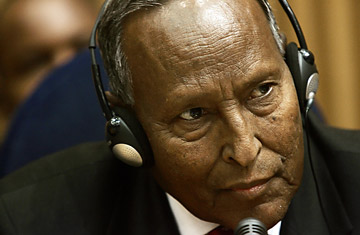
Former Somali transitional President Abdullahi Yusuf Ahmed looks on during a press conference
The U.N. refugee agency released a small news item last week that went largely unnoticed: Kenya's Dadaab refugee camp, destination for tens of thousands of fleeing Somalis since 1991, was full. "All [newly arriving] refugees have to find a place with relatives or friends, we no longer have any land to provide them," a UNHCR field officer said. The three camps that comprise Dadaab were built with 60,000 refugees in mind. They now house 230,000, and tens of thousands more are expected in the coming months.
Somalia, the country they are fleeing, continues to fall further into misery, seemingly unfazed by turmoil and despite the ministrations of the outside world. And on Monday, the President who had ruled the transitional government that was supposed to make things better stepped down.
President Abdullahi Yusuf Ahmed, 74, acknowledged to the country's parliament that Somalia was paralyzed and that there was nothing more he could do. "As I promised when you elected me on Oct. 14, 2004, I would stand down if I failed to fulfill my duty. I have decided to return the responsibility you gave me," Yusuf told them. "I said I will do everything in my power to make government work across the country. That did not happen either." That statement may just be a late contender for 2008 Understatement of the Year. At the very least, it is disingenuous. While it's true that Yusuf's government has never had any power, he must share some of the blame for Somalia's horrible condition.
Yusuf had opposed Prime Minister Prime Minister Nur Hassan Hussein's bid to sign a peace deal with some moderate Islamists in June. The President then tried to fire the Prime Minister, a move that was rejected by parliament. Pressure had been building for months for Yusuf to step down, and the infighting between government officials (whose power extends to one town — Baidoa — and a few square feet of Mogadishu) looked like the last straw. "President Abdullahi Yusuf has marginalized large parts of the population and exacerbated divisions," think tank International Crisis Group wrote in a recent report. "The latest confrontation with parliament and the Prime Minister has underlined that Yusuf hampers any progress on peace, has become a liability for the country's survival and should be encouraged to resign."
In the end, that's just what happened. It would be hard to believe that Yusuf was not forced out or given some financial incentive to leave, or both. The U.S., which had backed Yusuf for years, gave him the usual platitudes but signaled it was ready for a new approach. "We support and respect President Yusuf's decision to resign as President of the transitional federal government and welcome his commitment to continue supporting the Djibouti peace process," State Department spokesman Gordon Duguid said. "We acknowledge President Yusuf's contributions to long-term peace and stability in Somalia."
Duguid did not detail those contributions, and almost anyone would be hard-pressed to do so. Yusuf, a former Somali army officer, later became one of the country's most powerful warlords and had forced the previous Prime Minister, Ali Mohamed Gedi, to resign after a political struggle. He has enormous power because he comes from one of Somalia's biggest clans, the Darod, and carries the implicit threat of a new outbreak of clan fighting wherever he goes.
After stepping down, Yusuf was said to have retreated to his base in the semi-autonomous Puntland region. No one knows his next move. Ethiopian troops, who brought Yusuf into the presidential palace in Mogadishu two years ago, have announced they will withdraw from Somalia in a few days, and so far, there is no obvious candidate who could take Yusuf's place. Nor is there anyone considered powerful enough to united Somalia's ever-divided clans.
"I would be very glad to see peace and a central government in Somalia, but I do not think that the departure of [Yusuf] and Ethiopian troops will bring a peace," the departing President's adviser Abbi Has tells TIME. "Yusuf and Ethiopian troops were not in Somalia when the Somali people began to be held ransom, so all those people who are now saying Yusuf is blocking peace, where were they at that time?" — With reporting by Alexander Dawale / Nairobi
